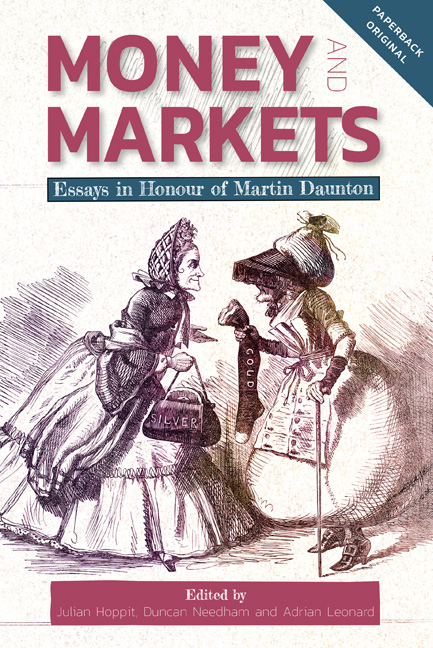Book contents
- Frontmatter
- Contents
- List of Figures
- List of Tables
- List of Contributors
- List of Abbreviations
- Introduction
- 1 Taxing London and the British Fiscal State, 1660–1815
- 2 Rents, Squalor, and the Land Question: Progress and Poverty
- 3 Marine Insurers, the City of London, and Financing the Napoleonic Wars
- 4 The Political Economy of Sir Robert Peel
- 5 Champagne Capitalism: France’s Adaptation to Britain’s Global Hegemony, 1830–80
- 6 The 1848 Revolution in Prussia: a Financial Interpretation
- 7 Imperial Germany, Great Britain and the Political Economy of the Gold Standard, 1867–1914
- 8 Knowledge, Contestation and Authority in the Eurodollar Market, 1959–64
- 9 Continuity and Change in British Conservative Taxation Policy, c. 1964–88
- 10 Britain Since the 1970s: a Transition to Neo-Liberalism?
- 11 Maplin: the Treasury and London’s Third Airport in the 1970s
- 12 Workfare and the Reinvention of the Social in America and Britain, c. 1965 to 1985
- 13 Charity and International Humanitarianism in Post-War Britain
- 14 Discounting Time
- 15 The Material Politics of Energy Disruption: Managing Shortages Amidst Rising Expectations, Britain 1930s–60s
- The Published Writings of Martin J. Daunton
- Index
- People, Markets, Goods: Economies and Societies in History ISSN: 2051-7467
4 - The Political Economy of Sir Robert Peel
Published online by Cambridge University Press: 13 April 2021
- Frontmatter
- Contents
- List of Figures
- List of Tables
- List of Contributors
- List of Abbreviations
- Introduction
- 1 Taxing London and the British Fiscal State, 1660–1815
- 2 Rents, Squalor, and the Land Question: Progress and Poverty
- 3 Marine Insurers, the City of London, and Financing the Napoleonic Wars
- 4 The Political Economy of Sir Robert Peel
- 5 Champagne Capitalism: France’s Adaptation to Britain’s Global Hegemony, 1830–80
- 6 The 1848 Revolution in Prussia: a Financial Interpretation
- 7 Imperial Germany, Great Britain and the Political Economy of the Gold Standard, 1867–1914
- 8 Knowledge, Contestation and Authority in the Eurodollar Market, 1959–64
- 9 Continuity and Change in British Conservative Taxation Policy, c. 1964–88
- 10 Britain Since the 1970s: a Transition to Neo-Liberalism?
- 11 Maplin: the Treasury and London’s Third Airport in the 1970s
- 12 Workfare and the Reinvention of the Social in America and Britain, c. 1965 to 1985
- 13 Charity and International Humanitarianism in Post-War Britain
- 14 Discounting Time
- 15 The Material Politics of Energy Disruption: Managing Shortages Amidst Rising Expectations, Britain 1930s–60s
- The Published Writings of Martin J. Daunton
- Index
- People, Markets, Goods: Economies and Societies in History ISSN: 2051-7467
Summary
On 24 June 2016 the Electoral Commission announced that the United Kingdom had voted to leave the European Union. Forty minutes later, David Cameron, the Conservative prime minister who had called the referendum to unite his party, resigned. He had campaigned to remain in the bloc. The same week 170 years earlier, on 29 June 1846, the Conservatives’ first ever prime minister, Sir Robert Peel, also resigned after splitting his party. While it was the question of Britain's continued membership of the EU which had divided Mr Cameron's Conservative party, Peel's split over his repeal of the Corn Laws, a set of import duties on cereals. Peel had forced the measure through with opposition votes. In revenge, protectionist backbenchers brought their own government down by vetoing its important Irish Coercion Bill. The split became permanent. Peel's parliamentary supporters within the old Conservative party became known as the ‘liberal’ Conservatives or Peelites, evolving into the modern Liberal party in 1859. The rebels formed a new Conservative party, the direct institutional ancestor of today's organisation of that name.
Historians have long argued over why Peel u-turned over the issue of the Corn Laws and split his party apart over it, in retrospect permanently. In contrast, his role in establishing a new economic-policy paradigm, one that lasted until 1931, has been downplayed. Although Norman Gash praised Peel as ‘chief architect’ of the mid-Victorian ‘age of stability’, historians generally see William Gladstone and Benjamin Disraeli as pivotal in establishing a political consensus around ‘sound’ finance. But as Martin Daunton has pointed out, the historiographical veneration of Gladstone has downplayed Peel's role in establishing the policies Gladstone continued as his protégé. Peel, as chairman of the Currency Commission in 1819, a cabinet minister in the 1820s, and prime minister in the 1840s, drove the adoption in Britain of the classic ‘gold standard’ policies, of which free trade was just one:
1. The value of British currency should be firmly fixed to a gold standard, with the pound freely convertible by the Bank of England.
2. Banknote supply should be limited based on a multiple of gold reserves.
3. Free movement of bullion from 1819, and free trade, or more accurately lower tariffs on food and raw materials, from 1842.
- Type
- Chapter
- Information
- Money and MarketsEssays in Honour of Martin Daunton, pp. 71 - 90Publisher: Boydell & BrewerPrint publication year: 2019

